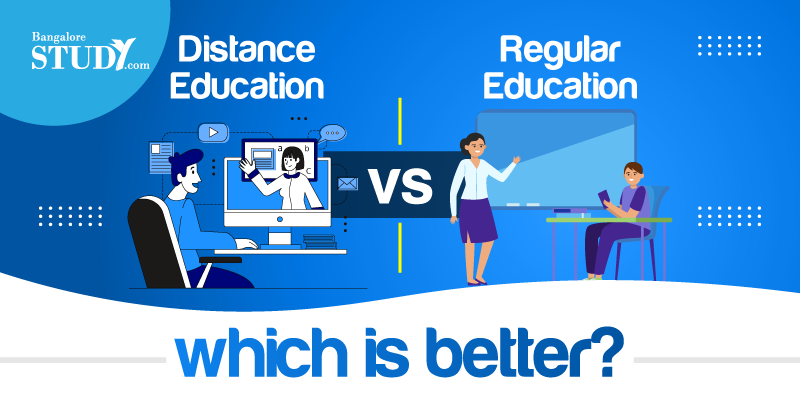Introduction
The debate between Distance education and Regular education has gained significant attention in recent years, particularly as technology continues to advance and reshape the way we learn. Distance education, once seen as a niche option, has become mainstream. On the other hand, regular or traditional education has been the gold standard for centuries.
What is Distance Education?
Definition and Overview
Distance education, also known as online learning, is a method of delivering education to students who are not physically present in a traditional classroom. The rise of the internet and advancements in communication technologies have made it easier for people to access educational resources from anywhere in the world.
Types of Distance Learning
- Synchronous Learning: Students and instructors interact in real-time through video conferencing, live chats, or webinars.
- Asynchronous Learning: Students complete the course material at their own pace, without real-time interaction, through recorded lectures and online forums.
What is Regular Education?
Definition and Overview
Regular education refers to the traditional form of learning where students attend classes in person. This is the system most people are familiar with, involving physical classrooms, scheduled lessons, and face-to-face interaction between teachers and students.
Traditional Learning Models
- Lecture-based Learning: Instructors teach in person while students listen and take notes.
- Group Discussions and Activities: Regular education often involves collaborative learning, where students work together on projects and discussions.
Advantages of Distance Education
Flexibility and Convenience
One of the biggest perks of distance education is the flexibility it offers. Students can study from the comfort of their homes, at times that suit them. Whether you’re a full-time worker, a parent, or someone with a hectic schedule, distance education can be tailored to fit around your life.
Lower Costs
Many distance education programs are more affordable compared to regular education. You can save on commuting, housing, and other associated costs, making it an appealing option for budget-conscious learners.
Personalized Learning Pace
Everyone learns differently. Distance education allows students to work at their own pace. If you’re quick at grasping concepts, you can move ahead faster, or if you need more time, you can review materials without feeling rushed.
Advantages of Regular Education
Structured Environment
Regular education offers a structured learning environment where students follow a fixed schedule. This consistency can be beneficial for those who thrive on routine and discipline.
Face-to-Face Interaction
There’s something about in-person interaction that can’t be replaced. Regular education fosters better communication between students and teachers, as well as among peers, which can lead to a deeper understanding of the material.
Extracurricular Activities
Regular schools and universities provide opportunities for students to engage in extracurricular activities like sports, music, drama, and social clubs, which play an essential role in personal development.
Challenges of Distance Education
Lack of Social Interaction
While distance education offers flexibility, it often lacks the social aspect of traditional learning. Students may miss out on interacting with their peers, making it harder to build networks or friendships.
Requires Self-discipline
Distance learning requires a high level of self-discipline and motivation. Without the structure of regular education, some students may struggle to keep up with their coursework.
Technological Barriers
Not everyone has access to high-speed internet or a reliable computer, which can pose challenges for those pursuing online education.
Challenges of Regular Education
Rigid Schedule
Regular education often follows a fixed schedule, which can be restrictive for those who have work commitments or other responsibilities outside of school.
Higher Costs
Traditional education typically comes with higher tuition fees and additional costs, such as commuting and accommodation.
Geographical Limitations
You can only attend schools or universities within a certain distance of where you live, limiting your options if you’re looking for specific courses or renowned institutions.
Cost Comparison: Distance vs Regular Education
When comparing the two, distance education generally wins in terms of cost-effectiveness. Not only do you save on tuition, but you also avoid other expenses associated with commuting, accommodation, and daily living. However, scholarships and financial aid are often more readily available for traditional education programs.
Impact on Career Opportunities
Employers’ Perception of Distance Learning
In the past, distance education carried a stigma. However, today many employers recognize the value of online degrees, especially when earned from accredited institutions. The key is ensuring the program is reputable.
How Traditional Degrees Are Viewed
Traditional degrees are still highly regarded and can offer more networking opportunities, which are often crucial for certain careers, especially in fields like law, medicine, or business.
Technology’s Role in Distance Education
The Importance of Online Platforms
Online platforms like Zoom, Google Classroom, and Moodle have revolutionized distance education, providing seamless ways for students to attend lectures, submit assignments, and collaborate with peers.
Tools That Make Distance Learning Possible
From video conferencing to cloud storage and virtual labs, there are countless tools that enhance the learning experience for distance education students.
How COVID-19 Changed Education
Shift Toward Online Learning
The COVID-19 pandemic forced many traditional institutions to adopt online learning models. This led to the widespread acceptance of distance education as a viable alternative, even for those who never considered it before.
The Blended Learning Model
As schools and universities reopened, many adopted a blended learning model that combines both in-person and online teaching, giving students the best of both worlds.
Which is Better for Self-Motivated Students?
Distance education is ideal for self-motivated students who can manage their time and responsibilities independently. The flexibility and autonomy it provides can help these students thrive.
Which is Better for Social Learners?
For students who thrive in social settings and benefit from face-to-face interaction, regular education is the better option. The collaborative environment and in-person support make it easier for social learners to succeed.
Conclusion: Which Education Model is Right for You?
In the end, the choice between distance and regular education comes down to your personal needs and circumstances. If you’re someone who values flexibility, affordability, and self-paced learning, distance education may be the way to go. On the other hand, if you thrive in structured environments with social interaction, traditional education might be the better choice. The key is to weigh the pros and cons and consider what works best for your learning style and career goals.




